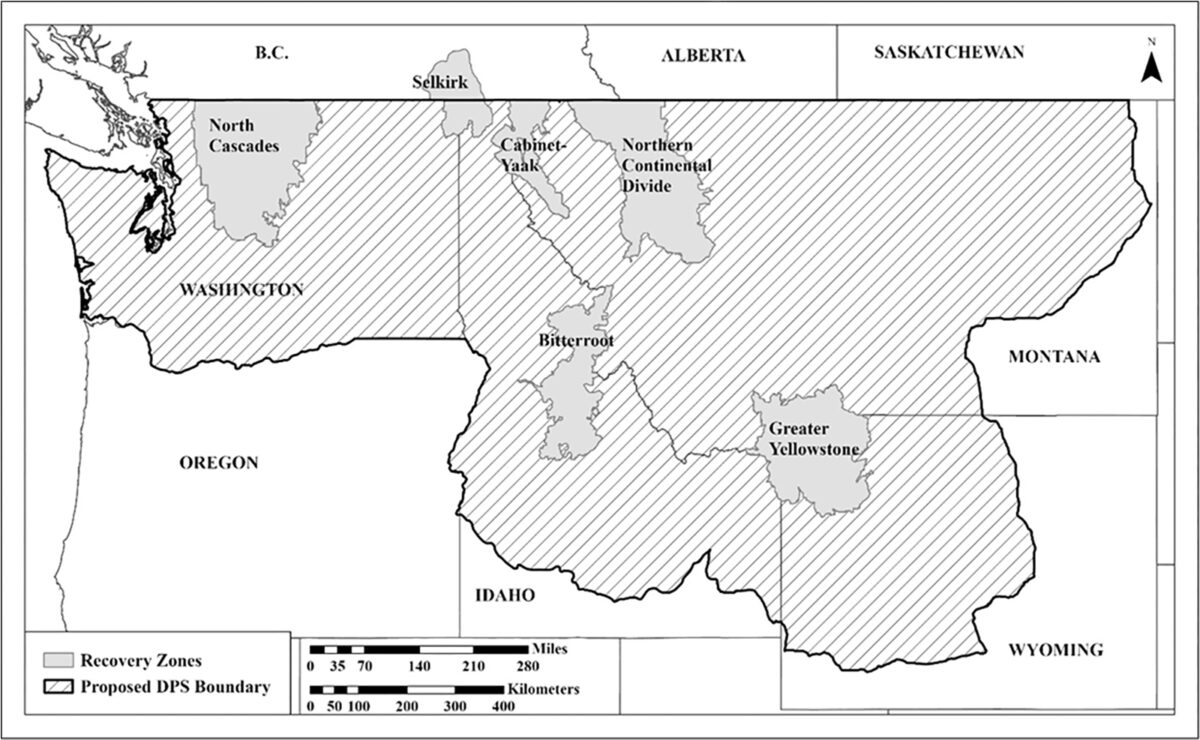Feds Reject Petitions to Delist Grizzly Bears, Recommend Revising ESA Recovery Goals
In a highly anticipated move that generated immediate backlash against the Biden administration, the U.S. Fish and Wildlife Service recommended establishing a single distinct population segment encompassing grizzly bear habitat in Montana, Wyoming and Idaho
By Tristan Scott
The U.S. Fish and Wildlife Service (FWS) on Wednesday rejected petitions by state governments in Montana and Wyoming to delist grizzly bears in their respective recovery zones, moving instead to establish a single distinct population segment encompassing grizzly habitat in both states, as well as in Idaho and Washington.
“This reclassification will facilitate recovery of grizzly bears and provide a stronger foundation for eventual delisting,” FWS Director Martha Williams said in a prepared statement. “And the proposed changes to our … rule will provide management agencies and landowners more tools and flexibility to deal with human/bear conflicts, an essential part of grizzly bear recovery.”
The agency announced it is publishing an independently peer-reviewed updated species status assessment that compiles the best available scientific information, which helps to inform decision-making.
Grizzly bears were listed under the ESA in 1975 throughout the lower 48 states, including areas outside the species’ historic range. FWS’ proposed rule would revise that listing to establish a single distinct population segment (DPS) encompassing areas in Idaho, Montana, Washington, and Wyoming, where suitable habitat exists and where grizzly bears currently reside or are expected to establish as populations recover. The grizzly bear DPS would retain threatened status under the ESA. The proposed action removes ESA protections outside the newly proposed DPS, where grizzly bears do not occur and are not expected to inhabit in the future.
FWS framed the recommendation as “a first step toward fulfilling a settlement agreement with the state of Idaho” requiring an evaluation of the grizzly bear listing in the lower 48 states by January 2026.
“With today’s announcement, the Service also responds to petitions from the states of Montana and Wyoming to establish and delist [distinct population segments] for the Northern Continental Divide Ecosystem and Greater Yellowstone Ecosystem, respectively, and finds these petitioned actions ‘not warranted,’” according to FWS. “After a thorough review of the best scientific and commercial data available, the Service found grizzly bear populations in those two ecosystems do not, on their own, represent valid [distinct population segments].”
The announcement prompted immediate backlash from Montana Gov. Greg Gianforte, who in a prepared statement blasted the Biden administration for “scorched earth tactics” and rejecting petitions to delist the species in the president’s final days in office “after sitting on them for years.”
“Joe Biden has embraced a scorched earth strategy on his way out the door,” Gianforte said in a prepared statement. “He’s issued special favors to his son, banned offshore drilling, and released terrorists from Guantanamo Bay. Joe Biden continues to show contempt for the law and the American people. The full recovery of the grizzly bear across the Rocky Mountain region should be acknowledged and celebrated – period. It’s time for U.S. Fish and Wildlife Service to catch up with the science, follow the law, and return management of grizzlies to the states, where it belongs. We look forward to working with the incoming Trump administration to explore a new path forward.”
U.S. Sen. Steve Daines, R-Montana, released a similar statement accusing the federal administration of “moving the goalposts on recovery.”
“Today’s announcement is incredibly frustrating for Montana,” according to a statement from Daines’ office. “For decades, Montana has followed the science and as a result, the bear has more than recovered in the Greater Yellowstone and the Northern Continental Divide Ecosystems. Continuing to move the goalposts on recovery is only harming the bear and putting our Montanan communities at risk. This is a shameful partisan play, and I’ll be pushing back every step of the way.”

Conservation groups including Earthjustice, Friends of the Bitterroot, Friends of the Clearwater, WildEarth Guardians, and Wyoming Wildlife Advocates applauded FWS’ decision to reject the delisting petitions, even as they expressed disappointment with the proposal to remove ESA protections outside the newly proposed DPS, where grizzly bears don’t live and aren’t expected to in the future.
“We thank the Biden Administration for keeping grizzlies listed under the Endangered Species Act in the Northern Rockies and Washington, but we are disappointed with the proposal to remove protections for the remaining states in the Lower-48,” according to a joint statement from the groups. “With the current threat of habitat loss and climate change, grizzlies have a ways to go until they are recovered. Importantly, the States of Montana, Idaho, and Wyoming are grossly unprepared to manage grizzlies and have adopted anti-predator policies that would reverse the recovery of this iconic native species.”
The decision to reject the petitions for delisting signals an about-face by the FWS, which last year found that both Montana’s and Wyoming’s petitions “presented substantial information” that the Northern Continental Divide Ecosystem in Montana and the Greater Yellowstone Ecosystem (GYE) in Montana and Wyoming “may qualify as a DPS and that threats have been reduced in the NCDE such that the population may no longer meet the definition of a threatened species” under the Endangered Species Act.
Since that finding, a conservation group filed suit in federal court challenging federal and state actions regarding the lethal removal of three grizzly bears in Idaho. In a settlement agreement with the FWS last year, the agency committed to issuing a final rule that “revises or removes the entire ESA listing of grizzly bears in the lower-48 states” on or before Jan. 31, 2026. And last July, Montana submitted a 60-day notice of intent to sue FWS under the ESA for failing to issue a 12-month finding on the state’s petition requesting the designation and subsequent delisting of an NCDE DPS.

Explaining its recommendation to revise recovery goals, FWS wrote that grizzly bear populations have moved geographically closer, with documented genetic exchanges between some populations, “indicating recovery zones are no longer discrete.”
“This increased movement of grizzly bears illustrates the success of conservation and management efforts to date while highlighting the importance of establishing and maintaining conservation measures and management practices that foster continued movement of bears,” according to FWS. “Establishing a single DPS encompassing all six recovery zones will provide a comprehensive and scientifically based framework for recovery.”
Grizzly bear distribution has significantly expanded, largely due to the commitments of state, federal, and Tribal agencies. These partners have played a key role in the on-the-ground management of grizzly bears for over 40 years by dedicating significant resources toward monitoring and management; in addition, private landowners have made sacrifices to accommodate grizzly bears.
FWS also issued what’s called a 4(d) rule that will revise the existing rule to give management agencies and landowners greater flexibility and tools to kill bears in the context of research and conflict management.
“Grizzly bear expansion is challenging for local communities and working lands, and the Service is committed to a collaborative approach and helping partner agencies, private landowners, and livestock producers by providing additional management tools,” according to FWS. “Management tools can be implemented along with important safeguards to promote connectivity and resiliency that are necessary for delisting. The proposed 4(d) rule recognizes the need for added flexibility and responsiveness on private lands and areas where grizzly bear populations are impacting private landowners and livestock producers while continuing efforts to promote conservation in areas crucial to the eventual delisting of grizzly bears in the lower 48 as a whole.”
FWS is accepting public comments on the proposed rule to designate a single DPS and the associated 4(d) revision during the 60-day comment period following its publication in the Federal Register in the coming days.